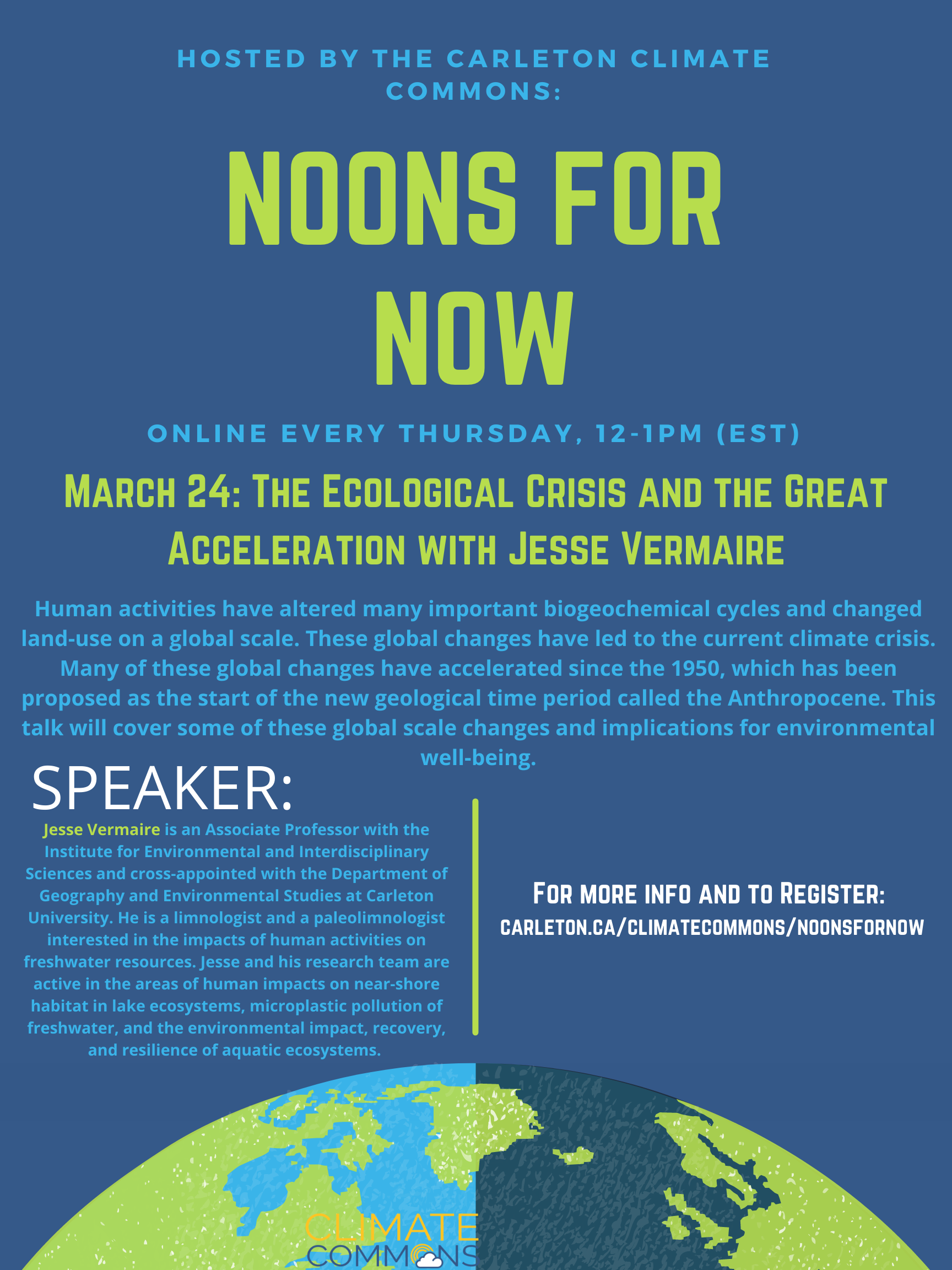
This event discussed the emergence of global climate change. Human activities have altered many important biogeochemical cycles and changed land-use on a global scale. These global changes have led to harmful algae blooms, loss of biodiversity, and to the current climate crisis. Many of these global changes have accelerated since the 1950, which has been proposed as the start of the new geological time period called the Anthropocene. This talk covered some of these global scale changes and implications for environmental well-being.
Jesse Vermaire is an Associate Professor with the Institute for Environmental and Interdisciplinary Sciences and cross-appointed with the Department of Geography and Environmental Studies at Carleton University. He is a limnologist and a paleolimnologist interested in the impacts of human activities on freshwater resources. Jesse and his research team are active in the areas of human impacts on near-shore habitat in lake ecosystems, microplastic pollution of freshwater, and the environmental impact, recovery, and resilience of aquatic ecosystems.
Born Into a Dying World: Human Health vs Ecological Stability
Noons For Now hosted another teach-in with guest speaker Jesse Vermaire a couple of weeks ago, on Thursday, March 24. A professor at Carleton in the Department of Geography and Environmental Studies, Vermaire spoke about the scientific and analytical elements of the Great Acceleration—the fuel for our current ecological crisis. He began by stating that despite how planet Earth has been able to adapt in the past, this current global climate change is occurring at a faster rate than Earth can keep up. Many phenomena that influence the increasing global temperature are simultaneously responsible for maintaining a balanced global economy. The result is “positive human well-being and negative ecological effects,” according to Vermaire. Of the nine planetary boundaries (excluding two with missing information), Vermaire points out that four (climate change, biosphere integrity, land system change, and biochemical flows) are either within or beyond a zone of uncertainty. He spoke on a few of these creations, such as the carbon cycle, the nitrogen cycle, the phosphorous cycle, and the plastic cycle, all of which have a significant and increasing risk for human populations. These creations have each skyrocketed in the last century. The result is the emergence of a new era: The Anthropocene, in which human beings thrive off a dying planet. With the help of natural and social science, humanity could come up with a solution that ensures the benefits of human well-being are in place while maintaining a healthy climate.
written by Emma Cantlon.
Emma is a first-year student at Carleton University pursuing a Bachelor of Arts Honours in Political Science. Emma entered politics to study the role of government in the climate crisis, and specifically the effects and possibilities of globalization in tackling climate change. Their focus outside of school is finding and testing eco-friendly alternatives to miscellaneous necessities and advocating for the importance of individual efforts in dealing with the climate crisis.
Resource List
The following is a list of resources recommended by attendees at our event.
Click here to access Jesse Vermaire’s presentation slides from our March 24 Noons for Now
Will Steffen, Wendy Broadgate, Lisa Deutsch, Owen Gaffney, and Cornelia Ludwig. “The Trajectory of the Anthropocene: The Great Acceleration,” The Anthropocene Review, 2015.
Locating the Anthropocene and the Great Acceleration
Zoe Todd, “Indigenizing the Anthropocene,” in Art in the Anthropocene: Encounters Among Aesthetics, Politics, Environment and Epistemology, edited by Heather Davis and Etienne Turpin, 2015.
Max Liboiron, Pollution is Colonialism, 2021.
Considering Ways Forward
Andrew Mefferd, The No-Till Farming Revolution: High-Production Methods for Small-Scale Farmers, 2019.
John Doerr, Speed & Scale: An Action Plan for Solving our Climate Crisis Now, 2021.
Paul Hawken (editor), Drawdown: The Most Comprehensive Plan ever Proposed to Reverse Global Warming, 2017.
The UN’s Sustainable Development Goals, 2015.
To-Dos
At the end of each of our teach-ins, we endeavor to come up with some concrete actions and resources to address the issue discussed.
- Consider individual actions such as eliminating the use of chemical fertilizers
- As we think about ways of approaching climate change, consider the importance of human wellbeing. What does the category of wellbeing mean? How do current definitions of wellbeing shape action? Are there ways these definitions could be, or should be, modified?